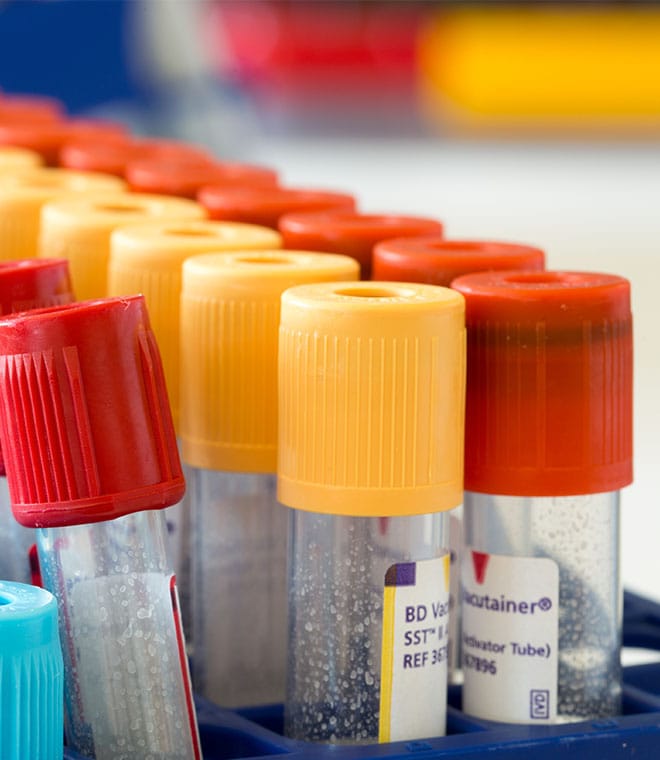Health
What are the symptoms and causes of high triglycerides?
By Keyur Mavani, MD, Fellow of the American College of Cardiology, FACP Aug 11, 2023 • 7 min
As many as 1 out of every 4 adults has high triglycerides, resulting in an increased risk for heart disease, heart attack and stroke. Learning what triglycerides are, what causes them to become elevated and what warning signs to look for can help you take steps to reduce your risk of high triglycerides.
What are triglycerides?
Your body converts the calories in food into energy to power all of its processes. When you consume more calories than your body needs, the excess gets converted into waxy fats called triglycerides, which are stored in fat cells. Between meals, hormones trigger these fat cells to release triglycerides so they can be used for energy.
Is triglyceride a lipid?
Yes, triglycerides are lipids, fatty compounds that your body needs for various purposes. Triglycerides are one of the main forms of lipids present in the body.
Cholesterol vs. triglycerides
You may often see triglycerides and cholesterol discussed together. This is because elevated levels of both are a part of a condition known as metabolic syndrome. Both cholesterol and triglycerides are lipids. However, they perform different functions.
While triglycerides and cholesterol both come from foods you eat, cholesterol is also manufactured by the liver. In the body, triglycerides are used as a source of energy while cholesterol plays a role in the production of hormones, vitamin D and the membranes that enclose the cells.
What is the normal range for triglycerides?
Everyone has some amount of triglycerides present in their blood. Healthcare providers consider triglyceride levels of less than 150 milligrams per deciliter (mg/dL) of blood as normal.
What level of triglycerides is dangerous?
Having above-average triglyceride levels raises your risk of heart disease. Healthcare providers categorize elevated triglyceride levels as follows:
- Borderline high: 150 to 199 mg/dL
- High: 200 to 499 mg/dL
- Very high: 500 mg/dL and above
The higher your triglyceride levels are, the greater the risk for health complications. However, even people with only borderline high triglycerides are more likely to develop heart problems.
What are the symptoms of high triglycerides?
High triglycerides are unlikely to cause symptoms until they reach high or very high levels. As a result, most people don’t know that they have high triglycerides until their healthcare provider performs a routine blood test called a lipid panel.
When triglycerides reach high or very high levels, they can cause:
- Lipemia: This is the presence of a high concentration of lipids (fats) in the blood. A healthcare provider may notice lipemia during an exam.
- Skin changes: High triglyceride levels can lead to damage on the skin of the legs, arms, chest and back.
- Chylomicronemia syndrome: At extremely high levels, such as 1,500 mg/dL and above, a person may develop chylomicronemia syndrome, a condition where the body isn’t able to properly break down lipids. Symptoms include abdominal pain, memory loss, loss of feeling in the arms and legs, and yellow deposits of fatty material on the skin.
- Acute pancreatitis: High triglyceride levels over 500 mg/dL can cause inflammation of the pancreas, a condition that’s potentially life-threatening.
What causes high triglycerides?
A number of factors can contribute to high triglycerides, including the following:
Diet
Since triglycerides come from food, diet has a major impact on the levels of these lipids. Specifically, diets high in sugar, refined carbohydrates and some fats can contribute to high triglycerides. In addition, consistently consuming more calories than you burn through physical activity can raise triglyceride levels.
What foods cause high triglycerides?
Foods that may contribute to high triglycerides include:
- Alcohol
- Fruit juices, especially those with sugar added
- Sweets, such as candy, cookies, ice cream and pastries
- Refined carbohydrates, such as white bread, pasta and bagels
- Sugary drinks, such as soda, flavored iced coffee beverages and sports drinks
- Processed foods that contain trans fats (partially hydrogenated oils)
- Foods high in saturated fat, such as butter, pork, beef, lamb, fried foods, cream, poultry with the skin on, whole milk and dairy products made with whole milk
Sedentary lifestyle
A lack of exercise can increase your risk of having high triglycerides. When you don’t get enough exercise, your body is more likely to have leftover calories to store in the form of triglycerides.
Smoking
People who smoke cigarettes are at a higher risk for developing high triglycerides than those who don’t.
Medications
Some drugs used to treat and manage medical conditions can cause triglyceride levels to become elevated. These include:
- Diuretics, such as hydrochlorothiazide and beta blockers used to treat high blood pressure
- Cancer drugs
- Hormones
- HIV medications
- Corticosteroids used to treat inflammation
Health conditions
Some medical conditions can contribute to high triglycerides, including:
- Genetic disorders
- Kidney disease
- Liver disease
- Thyroid disease
- Type 2 diabetes, especially when not controlled
Being overweight or obese also increases the risk of having high triglycerides due to the presence of excess body fat.
How do I lower my triglycerides?
Lifestyle changes can have a positive impact on triglyceride levels. Eating a well-balanced diet low in sugar and refined carbohydrates, limiting saturated fats and avoiding trans fats can be helpful. Exercising regularly can also make a difference. Exercise can also help you lose weight to further lower your triglycerides. Getting enough sleep, managing stress, quitting smoking and limiting alcohol consumption can also help.
Your healthcare provider can also recommend treatments for high triglycerides as needed. Fibrates, concentrated omega-3 fatty acids, statins and other cholesterol-lowering drugs may be prescribed for high triglycerides if you have cardiovascular disease.
Talk to your healthcare provider for customized advice about how to lower your triglycerides and support heart health.
Updated August 2023.
Sources:
- https://www.heart.org/en/health-topics/cholesterol/hdl-good-ldl-bad-cholesterol-and-triglycerides
- https://www.nhlbi.nih.gov/health/high-blood-triglycerides
- https://my.clevelandclinic.org/health/body/24425-lipids
- https://www.umassmed.edu/nutrition/Cardiovascular/handouts/lowering-triglycerides/
- https://www.hopkinsmedicine.org/health/conditions-and-diseases/high-cholesterol/cholesterol-in-the-blood
- https://www.health.harvard.edu/heart-health/should-you-worry-about-high-triglycerides
- https://my.clevelandclinic.org/health/articles/11117-triglycerides
- https://medlineplus.gov/triglycerides.html
- https://www.mayoclinic.org/diseases-conditions/high-blood-cholesterol/in-depth/triglycerides/art-20048186
- https://medlineplus.gov/ency/article/000405.htm
- https://www.mayoclinic.org/diseases-conditions/high-blood-pressure/expert-answers/blood-pressure-medications/faq-20057975
- https://my.clevelandclinic.org/health/diseases/23942-hypertriglyceridemia



